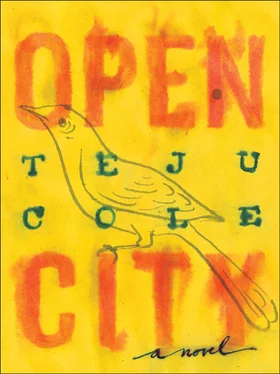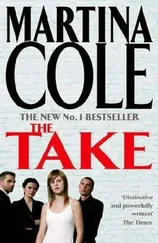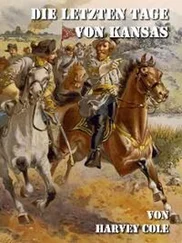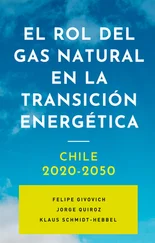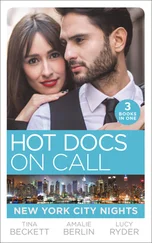I removed the steel plate covering the well, and peered inside. It was more than ninety feet to the waterline. Were the spirits still there? The well diggers had given them alcoholic drinks, which my father had paid for. Had the spirits been merely placated, or had they been banished? It was too far a drop for the surface of the water to be visible. I looked hard and saw nothing, so I took a stone, holding it over the center, and I let it fall. It hit the side of the well with a flat sound, and then retorted with a splash. I thought perhaps I should go upstairs and do my long division. I took a larger stone and threw it, hard. It ricocheted several times until the invisible water gulped it loudly. I took off my rubber slippers and sat on the edge of the well, at first with my feet on the outside, then, one at a time, on the inside, so that both legs dangled into the darkness. I felt cool and dangerous; but what if a spirit from the outside pushed me? The well was close to the perimeter fence. Something I had seen on television recently had convinced me that the spirits congregated in the corners of the perimeter fence, and so those four points were the only part of the compound I feared. I carefully brought both legs back to safety, replaced the plate, and went inside.
Upstairs, long division seemed out of the question. I put a searching hand into my shorts. I took off my shorts and briefs, and removed my T-shirt as well. I lay on my back, and fondled myself, but had no imagination, had no idea of what to do. My genitals lay squished in my palm. I suddenly remembered that I had seen a magazine once, years before, maybe when I was six or seven. The terrible excitement of it choked me, as did the notion that the magazine might still be somewhere in the house. I hastily pulled my clothes back on, and went downstairs to the study, and started searching, frantically but quietly, in the stacks of old magazines. It must have been something a wayward uncle of mine had left around, a glossy magazine (my memory could not have invented such details), and what it depicted was what I now desperately had to see again. I methodically went through the papers in the study, the old file folders with printed sheets and engineering graphs from my father’s years in graduate school, the annual reports of the Nigerian companies in which my parents held stock. I was at it for the better part of an hour. I flipped through a dusty paperback titled Body Language , a book of popular psychology from the seventies, but there was nothing of that kind of interest in it. I combed through all the binders in the bottom shelves, then gave up and went back upstairs. Then I took up the idea again, pushed by a longing that felt almost external to me, and looked under all the mattresses, mine, my father’s, my mother’s. I found nothing; I remade the beds. The exertion had left me winded and seething.
I went downstairs to the kitchen, and took out a bottle of Coke and went outside, again to the back of the house. The sky seemed to have cleared again. I sat on the steel plate, opened the bottle with my teeth, and sucked down the contents so fast that my throat hurt. I wiped my mouth, took the bottle to the storeroom, and took a warm bottle of Coke to put back in the fridge. It was a weeknight and my homework had not yet been done, and so I turned to that and, as I worked on it upstairs, I could hear Mama moving about downstairs. That was when it started raining, and not long afterward, I heard the car horn. I ran downstairs to open the gate. It was a torrential rainfall, and I was already soaked by the time I unlatched the padlock and swung the large metal doors open. The car came in, carrying my mother, the enforcer toward whom I wordlessly directed all the afternoon’s anger. I wasted time closing the gate. I tilted my head back, and the rain diluted the sticky sweetness still in my mouth. Then I ran to my mother to bring in the bags of food she had bought. I would have preferred to stay in the rain and drink it and whip around in it. But I went inside and changed out of my wet clothes. The power supply hadn’t returned, but it did so eventually, sometime before my father and his driver came back home at eight.
From that sudden beginning, the rain continued through the night, and through the next day, and the one after that. It was confusing, alarming in its relentlessness and intensity. We had known rain, but nothing like this. Even the concrete driveway of our house looked as if it was softening. Our wide gutters drained the water away, but out on the streets, life was a muddy mess. Many cars broke down in the inundated roads, and the commute to school took twice as long. I was morose. I didn’t tell anyone what was wrong, and nobody asked. The well, which I didn’t revisit, must have risen dramatically, and reflections might have become visible in its black water. It would have been strange to think — I didn’t think so then, but it occurs to me now — that this flood wasn’t worldwide. It seemed to have no boundaries, and was destined to last three solid days before it finally petered out.
The rain in Brussels was nothing so heavy, although the forecast said it would turn into a major storm by the weekend. It had become, in my thoughts, like a distant, drawn-out echo of that earlier childhood rain. But the story attached to that childhood rain was finished with, and of no import for the present. Part of it — the overheated desire, the oath — was good for a private joke, a thought that, when it flitted through my mind, amused me. I could no longer stand Coke, not its taste, not the rapacious company that produced it, or the ubiquitous screech of its advertising. For many years, I had been tempted to overinterpret the other events of that day, but what happened afterward, between my mother and myself, was due as much to any other day in my boyhood as to the day the rain began.
Looking out from my apartment and across the street, I saw a broken lightbulb and a newspaper lying in a puddle. The sidewalk pulsed with falling drops and, on the wall, someone had spray-painted the word ZOFIA and, in smaller letters, JE T’AIME.
I arrived too early at Aux Quatre Vents, where I was to have dinner with Dr. Maillotte. The sky, after seven days, was worsening, and I stood under the restaurant’s awning, attempting to repair the damaged top spring of my umbrella. Across the street was the soaring west façade of Notre Dame de la Chapelle. The wind tortured everything in its path, knocking down garbage bins, shaking leafless trees, blowing walkers off course, but it got no quarter from the cathedral itself. The stone hulk was lashed by rain, that was all. As Dr. Maillotte would not be arriving for another half hour, I headed across the street, toward the church.
The doors were open, and the first impression, on entering, was of total silence. But soon afterward, my ears adjusted to the quietness of the space, and I could hear the organ being played softly. I looked down the nave, but no one was visible. I walked down the aisle on the south side of the cathedral, under cool and soaring bays. Nothing of the rain outside was audible and, as I moved closer to the front, the music became clearer. Usually in these churches, there were one or two staff members about, and occasionally a handful of tourists as well. So I was surprised to find myself completely alone, save for the unseen organist, in such a cavern; it was desolate even for a rainy Friday afternoon. I noticed, just then, a dissonance in the sound of the organ music. There were distinct fugitive notes that shot through the musical texture, like shafts of light refracted through stained glass. I was sure it was a Baroque piece, not one I had heard before, but with all the ornamentation typical of that period, yet it had taken on the spirit of something else — what came to mind was Peter Maxwell Davies’s “O God Abufe” —a fractured, scattered feeling. It was at such low volume that, even as I heard the distinctly unsettling half step of a tritone repeated in the music, the melody itself was difficult to catch hold of.
Читать дальше
